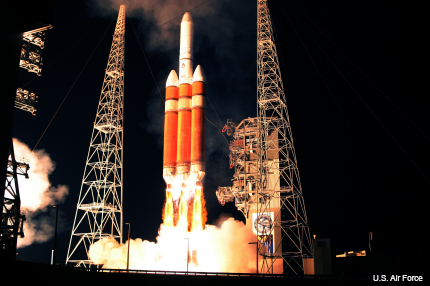SpaceX drops lawsuit, as Air Force continues ULA contract
An agreement will let Elon Musk's company compete for future military launches while the service maintains its current contract with ULA.

A new space race is starting to heat up. But unlike the Cold War-era competition between the United States and the Soviet Union, today’s race concerns private companies vying for U.S. military contracts.
SpaceX recently announced that it has dropped its lawsuit against the Air Force over its $11 billion contract with United Launch Alliance for the Evolved Expendable Launch Vehicle (EELV) program, as part of an agreement that will allow SpaceX to compete for future contracts.
SpaceX, run by Tesla CEO and technology innovator Elon Musk, filed the suit last spring, claiming that ULA enjoyed an unfair advantage with a virtual monopoly on space transportation contracting with the Defense Department. Musk said SpaceX’s Falcon 9 launch system could reliably perform the duties requested by the Air Force with cost savings up to 75 percent.
Even as the lawsuit remained, however, (and the Air Force asked a federal court to dismiss it) the Air Force and SpaceX have been coming closer together. In July, the Air Force certified three Falcon 9 launches as part of the process of approving SpaceX for the EELV program.
The new agreement will allow the Air Force to continue with its current contract with ULA. And in fact, the service yesterday awarded a $383 million modification on a contract worth over $4 billion to United Launch Services, a ULA subsidiary, to order Launch Vehicle Production Services that will carry equipment and satellites into space for the military. Specifically, the new modification focuses on supporting the launch vehicle configuration of one Air Force Delta IV, one Navy Atlas V 551 and one the National Reconnaissance Office Atlas V 401.
United Launch Alliance, a partnership between Boeing and Lockheed Martin, provides space transportation for the military, NASA and the National Reconnaissance Office aboard three launch vehicles, the Atlas V, Delta II and Delta IV.
The Evolved Expendable Launch Vehicle program, which provides the military transportation to space for critical national security missions and research, aims to reduce costs related to space travel, specifically among the current United Launch Alliance space crafts. In 2011, a new acquisition strategy that recognized exclusively that the Atlas V and Delta IV could provide reliable launch services was approved.
looking for a new rocket engineworking with Amazon founder Jeff Bezos



